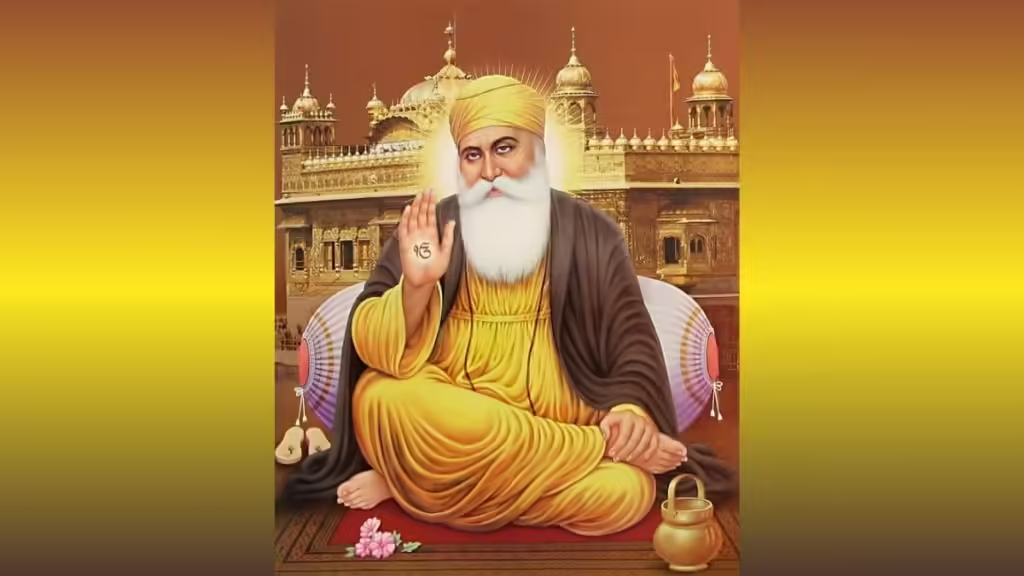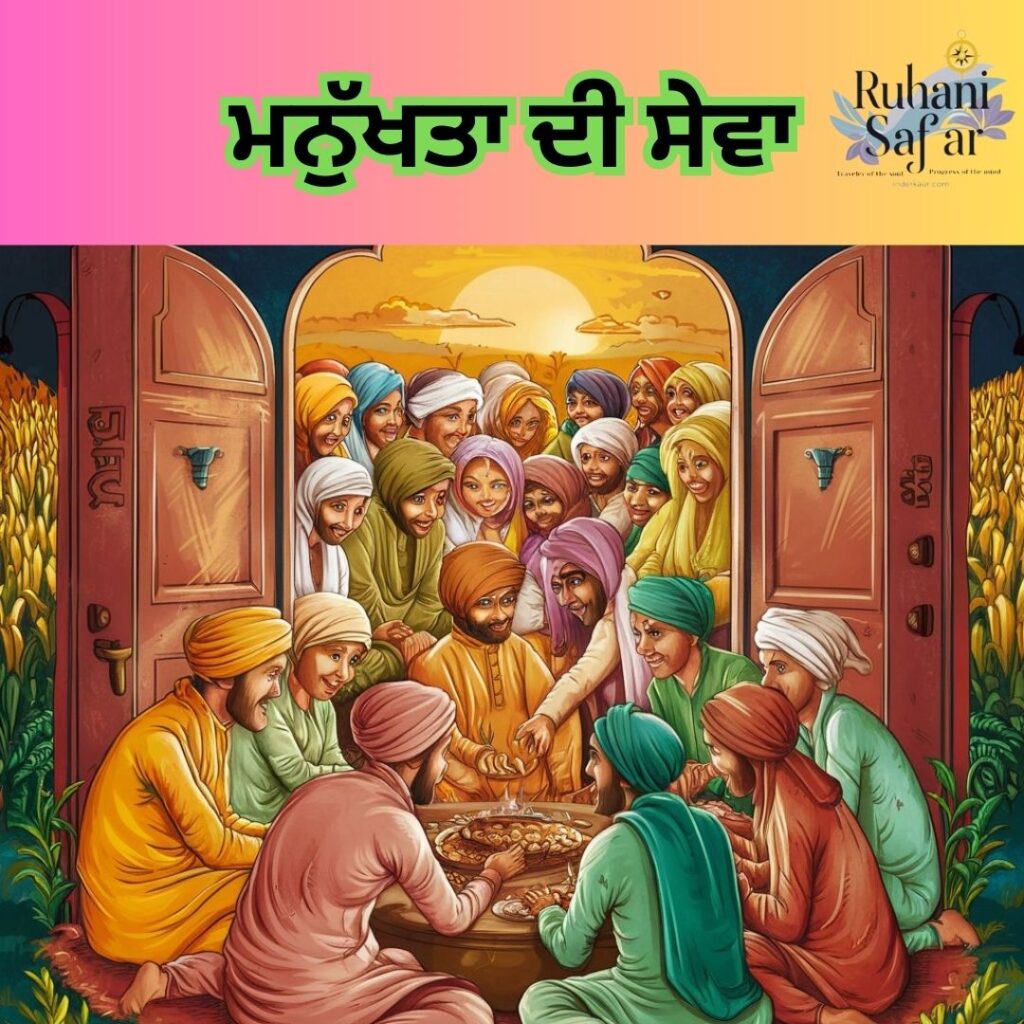Early Life: Guru Nanak Dev Ji was born on April 15, 1469, in Talwandi (now Nankana Sahib, Pakistan). He was curious and thoughtful from a young age. He often questioned the rituals and practices of religion.

Spiritual Experience: At the age of 30, Guru Nanak went to the river Bein. There, he had a profound spiritual experience and realized the oneness of God. He came back with the message that “there is no Hindu, there is no Muslim,” promoting unity among all people.
Teachings: Guru Nanak traveled extensively across India and beyond, sharing his teachings. He emphasized love, equality, and service to humanity. He taught that everyone is equal, regardless of caste or religion, and encouraged his followers to meditate and remember God.
Foundation of Sikhism: Guru Nanak is the founder of Sikhism. He established the concept of the “Guru,” a spiritual teacher. He also introduced the practice of Langar, where people of all backgrounds come together to share a meal, promoting equality.
Final Years: Throughout his life, Guru Nanak traveled to many places, spreading his message of peace and love. He passed away in 1539 at the age of 70, leaving a legacy that continues to inspire millions today.
Lessons from Guru Nanak Dev Ji
Unity of Humanity:
- Guru Nanak taught that all people are equal, regardless of their religion or background. He emphasized, “There is no Hindu, there is no Muslim.”

Service to Others:
- He encouraged selfless service (Seva) to humanity. Helping others is a way to serve God.
Meditation and Remembering God:
- Regular meditation and remembering God are essential for spiritual growth. It helps one stay connected to the divine.
Honesty and Hard Work:
- Guru Nanak emphasized living an honest life and earning a livelihood through hard work (Kirat Karni).
Community and Sharing:
- The practice of Langar (community kitchen) teaches the importance of sharing and equality. Everyone is welcome, regardless of their status.
Love and Compassion:

- Love for all living beings and compassion towards others is a fundamental teaching. We should treat everyone with kindness.

Guru Nanak Dev Ji’s Thought : “So Kyu Manda Aakhiye Jin Jame Raja”
The phrase “So Kyu Manda Aakhiye Jin Jame Raja” means “Why call someone bad who has been born from the same God?” Guru Nanak Dev Ji teaches us that everyone is equal and created by the same divine power. Instead of judging others based on their actions or status, we should see the inherent goodness in every person.
Key Points:
- Equality of All:
- Every person is created by God, so we should treat everyone with respect and kindness.
- Avoid Judgments:
- We should not judge others based on their appearance or actions. Everyone has a divine spark within them.
- Focus on Goodness:
- Instead of labeling people negatively, we should focus on their positive qualities and potential for growth.
One God for All:
- Guru Nanak taught that there is only one God who is the same for everyone, regardless of their religion. This promotes unity among all people.
Equality and Brotherhood:

- He emphasized that all humans are equal, and we should treat each other like brothers and sisters. No one is superior or inferior based on caste or status.
Importance of Truth:
- Guru Nanak believed in living a truthful life. Speaking the truth and being honest is essential for spiritual growth.
Service to Humanity:
- Selfless service (Seva) is a key teaching. Helping others without expecting anything in return is a way to serve God.
Meditation and Reflection:
- He encouraged meditation and remembering God to develop a deep connection with the divine. This helps in finding peace and happiness.
Living in Harmony:
- Guru Nanak stressed the importance of living in harmony with others. Peaceful coexistence is vital for a healthy society.
Punjabi Version
ਬਚਪਨ: ਗੁਰੂ ਨਾਨਕ ਦੇਵ ਜੀ ਦਾ ਜਨਮ 15 ਅਪਰੈਲ 1469 ਨੂੰ ਤਲਵੰਡੀ (ਹੁਣ ਨਾਨਕਨਾ ਸਾਹਿਬ, ਪਾਕਿਸਤਾਨ) ਵਿੱਚ ਹੋਇਆ। ਉਹ ਛੋਟੇ ਹੀ عمر ਤੋਂ ਸੋਚਣ ਅਤੇ ਸਵਾਲ ਪੁੱਛਣ ਵਾਲੇ ਸਨ। ਉਹ宗 ਰਿਵਾਜਾਂ ਅਤੇ ਧਰਮ ਦੀਆਂ ਪ੍ਰਥਾਵਾਂ ਬਾਰੇ ਪੁੱਛਦੇ ਰਹਿੰਦੇ ਸਨ।
ਆਧਿਆਤਮਿਕ ਅਨੁਭਵ: 30 ਸਾਲ ਦੀ ਉਮਰ ਵਿੱਚ, ਗੁਰੂ ਨਾਨਕ ਬੀਨ ਨਦੀ ਦੇ ਕੋਲ ਗਏ। ਉੱਥੇ, ਉਨ੍ਹਾਂ ਨੂੰ ਇੱਕ ਗਹਿਰਾ ਆਧਿਆਤਮਿਕ ਅਨੁਭਵ ਪ੍ਰਾਪਤ ਹੋਇਆ ਅਤੇ ਪ੍ਰਭੂ ਦੀ ਇਕਤਾ ਦਾ ਅਹਿਸਾਸ ਕੀਤਾ। ਉਨ੍ਹਾਂ ਨੇ ਇਹ ਸੁਨੇਹਾ ਦਿੱਤਾ ਕਿ “ਨਾ ਕੋਈ ਹਿੰਦੂ, ਨਾ ਕੋਈ ਮੁਸਲਮਾਨ,” ਜਿਸ ਨਾਲ ਸਾਰਿਆਂ ਵਿੱਚ ਇਕਤਾ ਦਾ ਪ੍ਰਬਲ ਸੁਨੇਹਾ ਮਿਲਿਆ।
ਸਿੱਖਿਆ: ਗੁਰੂ ਨਾਨਕ ਨੇ ਭਾਰਤ ਅਤੇ ਬਾਹਰ ਦੇ ਕਈ ਸਥਾਨਾਂ ‘ਤੇ ਯਾਤਰਾ ਕੀਤੀ, ਆਪਣੇ ਉਪਦੇਸ਼ਾਂ ਨੂੰ ਫੈਲਾਉਂਦੇ ਰਹੇ। ਉਨ੍ਹਾਂ ਨੇ ਪਿਆਰ, ਬਰਾਬਰੀ ਅਤੇ ਮਨੁੱਖਤਾ ਦੀ ਸੇਵਾ ‘ਤੇ ਜ਼ੋਰ ਦਿੱਤਾ। ਉਨ੍ਹਾਂ ਨੇ ਸਿਖਾਇਆ ਕਿ ਸਭ ਲੋਕ ਬਰਾਬਰ ਹਨ ਅਤੇ ਸਿਮਰਨ ਅਤੇ ਧਿਆਨ ਕਰਨ ਦੀ ਸਲਾਹ ਦਿੱਤੀ।
ਸਿੱਖੀ ਦੀ ਸਥਾਪਨਾ: ਗੁਰੂ ਨਾਨਕ ਸਿੱਖੀ ਦੇ ਸਥਾਪਕ ਹਨ। ਉਨ੍ਹਾਂ ਨੇ “ਗੁਰੂ” ਦੇ ਸੰਕਲਪ ਨੂੰ ਸਥਾਪਤ ਕੀਤਾ। ਉਨ੍ਹਾਂ ਨੇ ਲੰਗਰ ਦੀ ਪ੍ਰਥਾ ਦੀ ਸ਼ੁਰੂਆਤ ਕੀਤੀ, ਜਿਸ ਵਿੱਚ ਸਾਰੇ ਲੋਕ ਇਕੱਠੇ ਹੋ ਕੇ ਭੋਜਨ ਸਾਂਝਾ ਕਰਦੇ ਹਨ, ਜਿਸ ਨਾਲ ਬਰਾਬਰੀ ਦਾ ਸੁਨੇਹਾ ਮਿਲਦਾ ਹੈ।
ਅੰਤਿਮ ਸਾਲ: ਗੁਰੂ ਨਾਨਕ ਨੇ ਆਪਣੇ ਜੀਵਨ ਵਿੱਚ ਬਹੁਤ ਸਾਰੇ ਸਥਾਨਾਂ ‘ਤੇ ਯਾਤਰਾ ਕੀਤੀ, ਪਿਆਰ ਅਤੇ ਸ਼ਾਂਤੀ ਦਾ ਸੁਨੇਹਾ ਫੈਲਾਉਂਦੇ ਰਹੇ। ਉਹ 1539 ਵਿੱਚ 70 ਸਾਲ ਦੀ ਉਮਰ ‘ਚ ਪ੍ਰਾਨ ਛੱਡ ਗਏ, ਇੱਕ ਧਰੋਹਰ ਛੱਡ ਕੇ ਜੋ ਅੱਜ ਵੀ ਲੋਕਾਂ ਨੂੰ ਪ੍ਰੇਰਿਤ ਕਰਦਾ ਹੈ।
- ਗੁਰੂ ਨਾਨਕ ਨੇ ਸਿਖਾਇਆ ਕਿ ਸਾਰੇ ਲੋਕ ਬਰਾਬਰ ਹਨ, ਧਰਮ ਜਾਂ ਜਾਤ ਤੋਂ ਪਰੇ। ਉਨ੍ਹਾਂ ਨੇ ਕਿਹਾ, “ਨਾ ਕੋਈ ਹਿੰਦੂ, ਨਾ ਕੋਈ ਮੁਸਲਮਾਨ।”
Lessons from Guru Nanak Dev Ji
ਮਨੁੱਖਤਾ ਦੀ ਇਕਤਾ:
ਦੂਜਿਆਂ ਦੀ ਸੇਵਾ:
- ਉਨ੍ਹਾਂ ਨੇ ਮਨੁੱਖਤਾ ਦੀ ਸੇਵਾ (ਸੇਵਾ) ਦੀ ਪ੍ਰੇਰਨਾ ਦਿੱਤੀ। ਦੂਜਿਆਂ ਦੀ ਸਹਾਇਤਾ ਕਰਨਾ ਪ੍ਰਭੂ ਦੀ ਸੇਵਾ ਦਾ ਇਕ ਤਰੀਕਾ ਹੈ।

ਧਿਆਨ ਅਤੇ ਪ੍ਰਭੂ ਨੂੰ ਯਾਦ ਕਰਨਾ:
- ਨਿਯਮਤ ਧਿਆਨ ਅਤੇ ਪ੍ਰਭੂ ਨੂੰ ਯਾਦ ਕਰਨਾ ਆਧਿਆਤਮਿਕ ਵਿਕਾਸ ਲਈ ਅਹੰਕਾਰਿਤ ਹੈ। ਇਹ ਸਾਨੂੰ ਦਿਵ्यਤਾ ਨਾਲ ਜੁੜੇ ਰਹਿਣ ਵਿੱਚ ਮਦਦ ਕਰਦਾ ਹੈ।
ਇਮਾਨਦਾਰੀ ਅਤੇ ਮੇਹਨਤ:
- ਗੁਰੂ ਨਾਨਕ ਨੇ ਇਮਾਨਦਾਰ ਜੀਵਨ ਜੀਉਣ ਅਤੇ ਮੇਹਨਤ ਨਾਲ ਜੀਵਨ ਯਾਪਨ ਕਰਨ (ਕਿਰਤ ਕਰਨੀ) ‘ਤੇ ਜ਼ੋਰ ਦਿੱਤਾ।
ਸਮੁਦਾਇਕਤਾ ਅਤੇ ਸਾਂਝ:
- ਲੰਗਰ ਦੀ ਪ੍ਰਥਾ ਸਾਂਝ ਅਤੇ ਬਰਾਬਰੀ ਦੀ ਮਹੱਤਤਾ ਸਿਖਾਉਂਦੀ ਹੈ। ਹਰ ਕੋਈ ਸੁਆਗਤ ਹੈ, ਭਾਵੇਂ ਉਹ ਕਿਸੇ ਵੀ ਦਰਜੇ ਦਾ ਹੋਵੇ।
ਪਿਆਰ ਅਤੇ ਦਇਆ:
- ਸਾਰੇ ਜੀਵਾਂ ਲਈ ਪਿਆਰ ਅਤੇ ਦੂਜਿਆਂ ਵੱਲ ਦਇਆ ਗੁਰੂ ਦੇ ਮੁੱਖ ਸਿੱਖਿਆ ਹੈ। ਸਾਨੂੰ ਹਰ ਕਿਸੇ ਨਾਲ ਨਿੱਘਾ вести ਕਰਨਾ ਚਾਹੀਦਾ ਹੈ।
Guru Nanak Dev Ji’s Thought : “ਸੋ ਕਿਉਂ ਮੰਦਾ ਆਖੀਏ ਜਿਨ ਜਮੇ ਰਾਜਾ”
“ਸੋ ਕਿਉਂ ਮੰਦਾ ਆਖੀਏ ਜਿਨ ਜਮੇ ਰਾਜਾ” ਦਾ ਅਰਥ ਹੈ “ਉਸਨੂੰ ਮੰਦਾ ਕਿਉਂ ਕਹੀਏ ਜੋ ਇਕੋ ਪ੍ਰਭੂ ਤੋਂ ਜਨਮਿਆ ਹੈ?” ਗੁਰੂ ਨਾਨਕ ਦੇਵ ਜੀ ਸਾਨੂੰ ਸਿਖਾਉਂਦੇ ਹਨ ਕਿ ਹਰ ਇੱਕ ਮਨੁੱਖ ਬਰਾਬਰ ਹੈ ਅਤੇ ਇਕੋ ਹੀ ਦਿਵਿਆ ਸ਼ਕਤੀ ਦੁਆਰਾ ਬਣਿਆ ਹੈ। ਲੋਕਾਂ ਦੀਆਂ ਕਰਤੂਤਾਂ ਜਾਂ ਦਰਜੇ ਦੇ ਅਧਾਰ ‘ਤੇ ਜੱਜ ਕਰਨ ਦੀ ਬਜਾਏ, ਸਾਨੂੰ ਹਰ ਇਕ ਵਿਅਕਤੀ ਦੇ ਅੰਦਰੋਂ ਚੰਗਾਈ ਦੇ ਅੰਗ ਨੂੰ ਦੇਖਣਾ ਚਾਹੀਦਾ ਹੈ।

ਮੁੱਖ ਬਿੰਦੂ:
- ਸਭ ਦੀ ਬਰਾਬਰੀ:
- ਹਰ ਵਿਅਕਤੀ ਪ੍ਰਭੂ ਦੀ ਰਚਨਾ ਹੈ, ਇਸ ਲਈ ਸਾਨੂੰ ਹਰ ਕਿਸੇ ਨਾਲ ਇੱਤਿਵਾਰ ਅਤੇ ਦਇਆ ਨਾਲ ਪੇਸ਼ ਆਉਣਾ ਚਾਹੀਦਾ ਹੈ।
- ਜੱਜ ਕਰਨ ਤੋਂ ਬਚੋ:
- ਸਾਨੂੰ ਦੂਜਿਆਂ ਨੂੰ ਉਨ੍ਹਾਂ ਦੇ ਦੇਖਣ ਜਾਂ ਕਰਤੂਤਾਂ ਦੇ ਆਧਾਰ ‘ਤੇ ਨਜਾਇਜ਼ ਨਹੀਂ ਜੱਜ ਕਰਨਾ ਚਾਹੀਦਾ। ਹਰ ਇੱਕ ਵਿਅਕਤੀ ਦੇ ਅੰਦਰ ਇੱਕ ਦਿਵਿਆ ਚਮਕ ਹੈ।
- ਚੰਗਾਈ ‘ਤੇ ਧਿਆਨ:
- ਲੋਕਾਂ ਨੂੰ ਨਕਾਰਾਤਮਕ ਢੰਗ ਨਾਲ ਲੇਖਣ ਦੀ ਬਜਾਏ, ਸਾਨੂੰ ਉਨ੍ਹਾਂ ਦੀਆਂ ਚੰਗੀਆਂ ਖੂਬੀਆਂ ਅਤੇ ਵਿਕਾਸ ਦੀ ਸੰਭਾਵਨਾ ‘ਤੇ ਧਿਆਨ ਦੇਣਾ ਚਾਹੀਦਾ ਹੈ।
ਇੱਕ ਪ੍ਰਭੂ ਸਭ ਲਈ:
- ਗੁਰੂ ਨਾਨਕ ਨੇ ਸਿਖਾਇਆ ਕਿ ਇੱਕ ਹੀ ਪ੍ਰਭੂ ਹੈ ਜੋ ਸਾਰਿਆਂ ਲਈ ਹੈ, ਭਾਵੇਂ ਉਹ ਕਿਸੇ ਵੀ ਧਰਮ ਦੇ ਹੋਣ। ਇਸ ਨਾਲ ਸਾਰਿਆਂ ਵਿਚ ਇਕਤਾ ਦਾ ਪ੍ਰੋਤਸਾਹਨ ਮਿਲਦਾ ਹੈ।
ਬਰਾਬਰੀ ਅਤੇ ਭਾਈਚਾਰਾ:
- ਉਨ੍ਹਾਂ ਨੇ ਜ਼ੋਰ ਦਿੱਤਾ ਕਿ ਸਾਰੇ ਮਨੁੱਖ ਬਰਾਬਰ ਹਨ ਅਤੇ ਸਾਨੂੰ ਇਕ ਦੂਜੇ ਨੂੰ ਭਾਈ-ਭੈਣ ਦੀ ਤਰ੍ਹਾਂ ਪੇਸ਼ ਆਉਣਾ ਚਾਹੀਦਾ ਹੈ। ਕੋਈ ਵੀ ਜਾਤ ਜਾਂ ਦਰਜੇ ਦੇ ਆਧਾਰ ‘ਤੇ ਉੱਚ ਜਾਂ ਨੀਵਾਂ ਨਹੀਂ ਹੈ।
ਸੱਚਾਈ ਦੀ ਮਹੱਤਤਾ:
- ਗੁਰੂ ਨਾਨਕ ਨੇ ਸੱਚੀ ਜੀਵਨ ਜੀਉਣ ‘ਤੇ ਜ਼ੋਰ ਦਿੱਤਾ। ਸੱਚ ਬੋਲਣਾ ਅਤੇ ਇਮਾਨਦਾਰ ਰਹਿਣਾ ਆਧਿਆਤਮਿਕ ਵਿਕਾਸ ਲਈ ਜਰੂਰੀ ਹੈ।
ਮਨੁੱਖਤਾ ਦੀ ਸੇਵਾ:

- ਬੇਲੋਭ ਸੇਵਾ (ਸੇਵਾ) ਇੱਕ ਮੁੱਖ ਸਿੱਖਿਆ ਹੈ। ਦੂਜਿਆਂ ਦੀ ਮਦਦ ਕਰਨਾ ਬਿਨਾਂ ਕਿਸੇ ਉਮੀਦ ਦੇ, ਪ੍ਰਭੂ ਦੀ ਸੇਵਾ ਕਰਨ ਦਾ ਇਕ ਤਰੀਕਾ ਹੈ।
ਧਿਆਨ ਅਤੇ ਚਿੰਤਨ:
- ਉਨ੍ਹਾਂ ਨੇ ਧਿਆਨ ਕਰਨ ਅਤੇ ਪ੍ਰਭੂ ਨੂੰ ਯਾਦ ਕਰਨ ਦੀ ਪ੍ਰੇਰਨਾ ਦਿੱਤੀ, ਤਾਂ ਜੋ ਦਿਵਿਆਤਾ ਨਾਲ ਗਹਿਰਾ ਸੰਬੰਧ ਵਿਕਸਿਤ ਕੀਤਾ ਜਾ ਸਕੇ। ਇਹ ਸ਼ਾਂਤੀ ਅਤੇ ਖੁਸ਼ੀ ਲੱਭਣ ਵਿੱਚ ਮਦਦ ਕਰਦਾ ਹੈ।
ਸਮਰਸਤਾ ਵਿੱਚ ਜੀਵਨ:
- ਗੁਰੂ ਨਾਨਕ ਨੇ ਦੂਜਿਆਂ ਨਾਲ ਸਮਰਸਤਾ ਵਿੱਚ ਜੀਵਨ ਦੀ ਮਹੱਤਤਾ ‘ਤੇ ਜ਼ੋਰ ਦਿੱਤਾ। ਸ਼ਾਂਤੀਪੂਰਕ ਜੀਵਨ ਲਈ ਇਹ ਬਹੁਤ ਜ਼ਰੂਰੀ ਹੈ।


